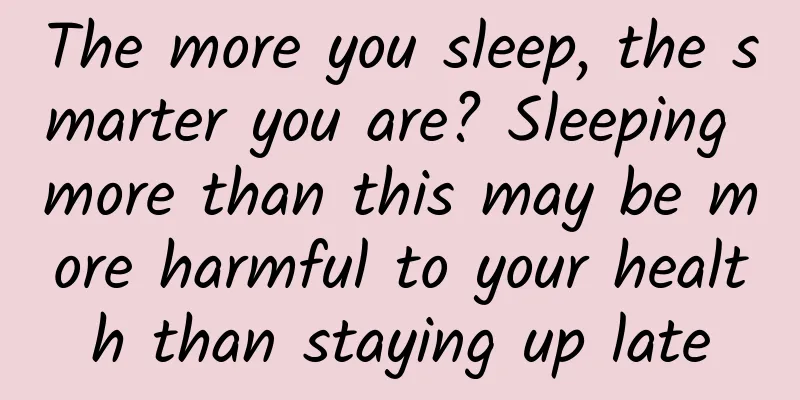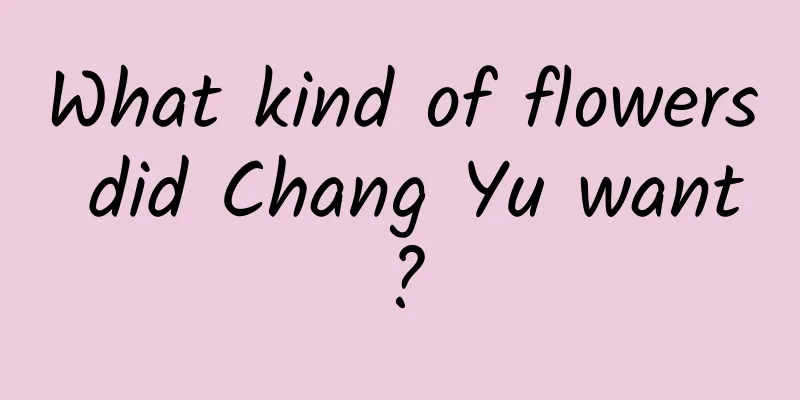The more you sleep, the smarter you are? Sleeping more than this may be more harmful to your health than staying up late

|
About one-third of a person's life is spent sleeping. Sleep is essential to our health. A good sleep will make you energetic, while a poor sleep will make you tired. Some people say that the longer you sleep, the smarter you are. Is this true? Is sleeping too long more harmful than staying up late? How can we have a good sleep? Is sleeping too much more harmful to your health than staying up late? Copyright image, no permission to reprint Answer: Possibly A major study published in the top journal Neurology in 2019 showed that if you sleep more than 9 hours at night and take a lunch break for more than 90 minutes, you will face a higher risk of stroke. In other words, if you sleep "too much", it will also be bad for your body. It is worth noting that this study was led by Professor Zhang Xiaomin of Tongji Hospital of Huazhong University of Science and Technology, and all the participants were Chinese. Because the disease and physiological problems between different races have been paid more and more attention, this study is more instructive for us. After 6 years of follow-up, 1,557 stroke cases were diagnosed based on clinical symptoms and CT or MRI imaging. The researchers analyzed and concluded: Compared with those sleeping 7 to <8 hours/night, those who slept longer (≥9 hours/night) had a 23% higher risk of stroke. People who napped for more than 90 minutes had a 25% higher risk of total stroke than those who napped for 1 to 30 minutes. In other words, people who sleep for 9 hours or more at night and take a nap for more than 90 minutes are more likely to have a stroke. It is said that staying up late is harmful to the body, and it seems that sleeping too much is not a good thing either. In this study, the researchers also found a point worthy of everyone's attention. When the sleep time reaches 9 hours or more at night, subjects aged 65 and above and subjects with hypertension, hyperlipidemia or diabetes have a "more obvious" risk of stroke. In addition, overweight people have a greater risk of stroke when they take a daytime nap for more than 90 minutes. In other words, people with underlying diseases have a higher risk of sleeping more, and the worse the health, the more they should avoid sleeping more. Does sleeping more make you smarter? Copyright image, no permission to reprint Answer: This understanding is wrong. Most people need about 6 to 8 hours of sleep, but 5% of people need less than this range, for example, less than 6 hours, or even less than 5 hours. There are also some people who need more sleep, for example, 8 hours, or even more than 10 hours. These people with more sleep needs are called "long sleepers". The main function of sleep is to improve the state of work and life during the day. The length of sleep is not the standard to measure the quality of sleep. The longer the sleep, the better. It is not that the sleep is longer, but it should be deep. A good sleep does not necessarily mean a long sleep, but it can restore physical energy well during the day, which can maintain the work and thinking needs of the day, and the overall mental state of the person is also better. If a person does not sleep for a long time, for example, only 5 to 6 hours, but is in good condition during the day and can easily cope with his life, it means that his sleep quality is acceptable. Whether you sleep short, sleep within the normal range, or are a "long sleeper", as long as you sleep within the range of your physiological needs, it is fine. There is no saying that "long sleepers" are smarter than "short sleepers". This understanding is wrong. How to have a good sleep? Copyright image, no permission to reprint 1. Do abdominal breathing before going to bed When you inhale, actively expand your abdominal muscles slowly, and when you exhale, actively retract your abdominal muscles slowly. This will reduce your breathing rate, make you relax, and reduce anxiety. 2. Get more sun and exercise Increase sunlight exposure during the day, which will accumulate more natural melatonin in the brain and help you sleep at night. Do more exercise, even just a half-hour walk, which will also help you sleep. 3. Maintain an optimistic mood Both objective things and one's own mentality can affect emotions. If there is no way to change objective things, try to change your perspective on things and then change your mentality. 4. Create a comfortable sleeping environment Maintain a regular life. A regular life not only includes work and rest, but also regular meals. The sleeping environment should be quiet and comfortable. Turn off the lights in time before going to bed and do not look at electronic devices. 5. Treat chronic diseases as early as possible Some urinary system diseases, respiratory system diseases, etc. will affect sleep quality. Patients with these diseases should seek treatment as soon as possible to restore sleep and form a positive cycle. 6. Do not abuse medication Some young people ignore their own physical condition and abuse melatonin, sleeping pills, etc., which are not only unhelpful in improving sleep, but may also have other side effects. Source and author: CCTV Life Circle, Yu Huan (Deputy Chief Physician of Neurology Department, Huashan Hospital Affiliated to Fudan University) The watermarked images and cover images in this article are from the copyright gallery, and the image content is not authorized for reprinting |
<<: How much energy was there at the time of the Big Bang? An incredible truth is deduced
>>: Put everything in the refrigerator? Be careful, it will go bad faster!
Recommend
The secret of a hit product: creating influence
Creating product influence is not a one-day job. ...
Android 10 is finally here, and these are the only phones that can use it!
At the Google I/O 2019 Developer Conference, Goog...
How did NetEase Cloud Music and Mobile QQ change their skins?
Android theme skinning can provide skin packages ...
The omen of heavy snow in the first month of the lunar year: What are the specific signs? The meaning and symbol of snow in the first month of the lunar year
It is now the first month of the lunar calendar i...
Free hardware no longer explores the root cause of the price increase of domestic mobile phones
In recent years, the domestic mobile phone indust...
Why do you find it increasingly difficult to understand what users like?
What do users really want? What should I give to ...
Are green beans "not suitable" for the table? Doctors teach you the secret of "non-toxic dry rice"
Recently, Luzhou, Sichuan issued the "Luzhou...
The popularity of "Honghuang Girl" is a microcosm of the era of sports fission
This Olympics was a bit dull, and the audience wh...
Five advantages of bidding hosting and bidding outsourcing!
The bidding hosting industry can make promotion p...
Can Dong Mingzhu's Gree washing machine break the Gree mobile phone curse?
Just as the hype about Gree mobile phones died do...
Drinking juice = eating fruit? Drinking lactic acid beverage = drinking yogurt? The difference is not a little bit!
"Drinking juice is equivalent to eating frui...
Don’t ever have this kind of “mindset”!
Author: Gao Shasha, attending physician of Zhengz...
What does Chinese people’s homesickness look like?
↑A group of National Geographic fans, focusing on...
Thinking about paid product scene placement under the high traffic situation
The competition among Internet products has shift...









